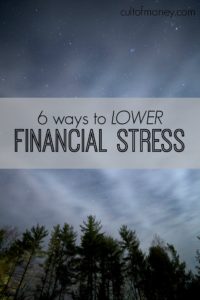 If you’re stressed about money all the time you’re not alone. According to the American Psychological Association 72% of Americans are stressed over money. That’s a lot!
If you’re stressed about money all the time you’re not alone. According to the American Psychological Association 72% of Americans are stressed over money. That’s a lot!
If you’re proactive you can eliminate much, if not all, of your financial stress. Here are some of the most common ways to lower your financial stress and set yourself up for success.
Establishing an Emergency Fund
An emergency fund is a specific set of savings earmarked only for emergencies. This money is meant to be used in the event you lose your job, your car breakdowns or some other unexpected and urgent expense pops up. This money should only be touched in the event of a true emergency.
It’s recommended that you save at least three to six months’ worth of your normal expenses in an emergency fund.
I personally am a bit of a worrier and like to keep my emergency at the higher end of the spectrum. Having this money to fall back on has been a huge stress relief for me and can be for you too.
An emergency fund will eliminate your need to rely on credit cards to get you through tough times.
Creating a Budget
We live in an instant gratification society. You no longer have to save up your cash and drive to a store to buy what you want. Nope, now you can hit up your favorite online retailer, add whatever you want to your cart, use the credit card that’s automatically on file and with a click of a button have some material goods shipped to your door in a matter of days.
This instant gratification and ease of spending has put many American’s budgets in the red.
If you really want to eliminate financial stress you have to stop spending more than you make, stop buying things you don’t really need and become aware of your financial situation. You can do this by creating a budget.
Figure out exactly how much you earn and how much you spend. At the very least you need to make sure that your earnings are higher that your spending. Ideally, though you should have a surplus of money that goes toward your financial goals and your retirement account.
Create a budget and stick with it. This will help ensure that you’re living within your means.
Eliminating Consumer Debt
Consumer debt is the worst. Especially credit card debt that often comes with interest rates higher than 20%. If you have high interest consumer debt you need to get rid of it, pronto.
The debt payoff method I prefer is the debt snowball. With the debt snowball you’ll make a list of all of your debts and list them from lowest balance to highest balance. You’ll then put as much money toward your lowest balance debt while making the minimum payments on all of your other debt. Once the lowest balance debt is paid off you’ll start working on the next lowest balance.
The downside to this method is that you may end up paying more in interest. To mitigate this you can use the debt avalanche method and start paying off your debts from highest interest rate to lowest interest rate while still making minimum payments on everything else.
Choose whichever method is more appealing to you. The important thing though is that you get rid of all consumer debt. (And stay out of it.)
Having Appropriate Insurance
I didn’t have health insurance for years and it was a huge stress. I used to think about it all the time. When I finally got insurance I felt like a weight had been lifted off of me.
Consider getting the following insurances if you don’t already have them:
- Auto Insurance
- Home/Renter’s Insurance
- Health Insurance
- Life and Disability Insurance (Especially if you have a family who depends on you.)
Saving for Retirement
No matter your age saving for retirement should be on your financial goals list. If this isn’t something that stresses you out now it will be when you get older and have nothing saved.
The good news is that saving for retirement is actually very easy.
If you have an employer sponsored retirement account start there. Contribute as much as you can up to the limit. If your employer doesn’t offer a retirement plan consider opening up an IRA with a place like Betterment.
Even saving $20 per month toward your retirement is better than nothing.
Earning Enough Money
Not earning enough money was my number one stressor after I got divorced. I had to two work two jobs just to stand on my two feet. After a while that got a little tiring and I decided to take my career into my own hands.
I started my own online business and within a couple years was making almost double what I had previously made working those two jobs.
The good news is that if you’re not earning enough money to get by, even on a tight budget, there are so many different things you can do to change that – even if you don’t have a college degree. (I don’t.) The bad news is that building a new career out of thin air is going to take a lot of work and perseverance.
If you’re not currently earning enough to money to get by start considering some new options for yourself.
It’s Your Life
I can make all the suggestions in the world but at the end of the day it’s your life and you’re the only one who can make a lasting change. If you want to eliminate financial stress put one foot in front of the other and take that first step today.

Alexa Mason is a freelance writer and wanna be internet entrepreneur. She is also a newly single mom to two beautiful little girls. She chronicles her journey as a single mom trying to make it big at www.singlemomsincome.com.
